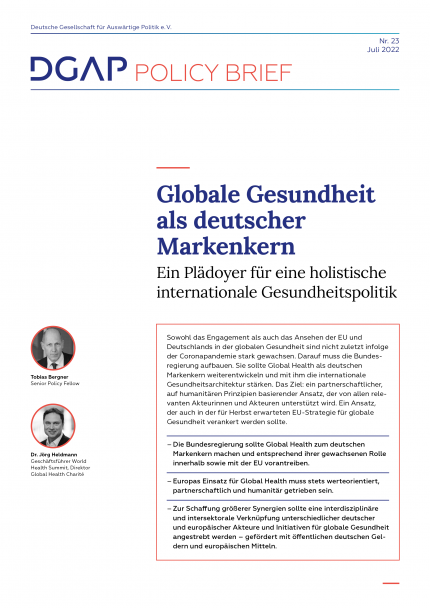This is the English translation of DGAP Policy Brief No. 23, which was published in July 2022. The PDF is only available in German and can be found here.
| The federal government should strive to make global health an integral part of Germany’s brand. It should promote global health both within the EU and in collaboration with the EU. |
| Europe’s endeavors in the area of global health must always be driven by a value-based, collaborative, and humanitarian approach. |
| Greater synergies should be created by promoting interdisciplinary and cross-sectoral links among different German and European stakeholders and initiatives in the field of global health. These efforts should be supported through national and European funding. |
The European Union is one of the most important actors within the field of global health policy. The EU and its member states are not only the biggest donors in the field of global health (recipients include: the WHO; The Global Fund to Fight AIDS, Tuberculosis, and Malaria; and Gavi, the Vaccine Alliance), but also in areas of health-related official development assistance and humanitarian aid. The EU member states are also co-initiators of COVAX (COVID-19 Vaccines Global Access), which is working for global equitable access to vaccines. The EU has thus taken on a leading role and must now meet the expectations it has raised. Both EU member states and the EU Commission are among the world’s top funders across the various multilateral health sector initiatives.
Among the EU nations, Germany has emerged as a particularly strong supporter of humanitarian causes. In addition to its increased involvement in shaping global health policy, the country has made global health a strategic priority over the past two years. This particular soft power tool is developing into an integral part of Germany’s brand and a source of worldwide recognition. Within the G7 and G20, the federal government is supporting efforts to strengthen healthcare systems, combat antimicrobial resistance, ensure universal health coverage, control infectious diseases, and improve pandemic prevention. Commenting on these efforts, Germany’s Minister for Health, Dr. Karl Lauterbach, said: “Health will be at the core of Germany’s G7 presidency. By setting this priority, the federal government is sending an important signal. The pandemic in particular has made clear that health-related challenges demand international solutions. We want to fight this pandemic together and learn the relevant lessons.”
In addition to its political involvement in and major financial contributions to health-related endeavors, Germany is also one of the world’s leading scientific and economic powers. The country’s pioneering role in this regard is primarily thanks to initiatives led by Angela Merkel, such as the cross-organizational and cross-sectoral processes supporting the Sustainable Development Goal 3 (SDG 3) as part of the Global Action Plan, which aims to improve cooperation in the global health architecture. Some of the measures introduced by Germany were developed in partnership with France. These include recommendations on reforms to strengthen the WHO and the “One Health” approach, which recognizes that the health of people, animals, and our environment are closely interconnected. Initially proposed by the French and German governments, the One Health High-Level Expert Panel was established in November 2020.
To complement these political endeavors and financial commitments, as well as to ensure greater efficiency, the EU and Germany should aim to increase their international visibility and cultivate a cross-sectoral and holistic approach to global health.
Europe Successfully Strengthens Its Commitment to Global Health
When the foreign ministers and health ministers of the European Union met in Lyon on February 9, 2022, France (which, at the time, held the presidency of the Council of the EU) emphasized that global health would be playing a more prominent role in EU international relations, and that the EU should assume its proper place within the field of global health – a position that reflects its contributions to both developmental and humanitarian causes. Africa formed a particular focus of France’s plans.
The European Union-African Union Summit, which was held on February 17 and 18, 2022, emphasized the significance of vaccine delivery and enabling Africa to manufacture its own vaccines, diagnostics, and therapeutics. The EU must now ensure the rapid implementation of any promises and commitments made. Much is at stake, including the EU’s credibility.
The EU member states are currently facing the challenge of providing adequate healthcare services to Ukrainian citizens granted access to the EU. This challenge will require the ongoing commitment of EU member states over the coming months. Similarly, the EU will need to continue supporting the beleaguered Ukrainian healthcare system.
The second half of 2022 will see the publication of a new EU strategy on global health. From September, this new strategy (which was initiated by the EU Commission) will be discussed by the EU member states. This presents an opportunity for the member states to work together to set out the basic parameters of the EU’s commitment to and involvement in the field of global health. This will involve a joint commitment to improving global health architecture, pandemic preparedness, cooperation with partner regions such as Africa, and developing a cross-cutting “One Health” strategy. This will also provide an opportunity for the EU to demonstrate the advantages of its collaborative approach to other global actors such as China and Russia.
Foundations and Features of the European and German Approach
Time and again, political representatives emphasize the value-driven nature of the German and European approach to foreign and development policy. A firm place within the international order and the multilateral landscape forms the foundations upon which the actions of the federal government and its European partners are built: the rule of law, respect for human rights, and a humanitarian approach. The Supply Chain Act (Lieferkettengesetz) is but one example of this.
Europe’s understanding of its own identity and values also demands a willingness to coordinate efforts with partner countries, in addition to ensuring that measures are designed to meet the needs of local people. The provision of financial support and loans is not intended to create dependency, but rather aims to enable the recipient country and its people to develop its (and their) own capacities.
This presents an opportunity to set out the basic parameters of the EU’s commitment to and involvement in the field of global health
In the field of global health, access to vaccines is governed by a close interplay among science, business, and politics. The same applies to diagnostics and drugs. The EU can work with the African Union (AU) to set out the conditions and requirements needed to enable local production.
The EU is home to a large number of pharmaceutical companies, drug manufacturers, and medical devices manufacturers. While the EU Commission has already established a platform for dialog with these manufacturers, this should now be intensified given business activities and opportunities in Africa.
Other players providing Europe with a unique selling point are non-governmental organizations that are active at the international level. By working with civil society organizations, the EU places itself in a position to maintain particularly close ties with and oversight over developments on the ground, as well as gaining a better understanding of the needs facing people in the countries of the Global South.
As a region with a strong focus on science and research, the EU (with Germany in a leading role) should drive the development of adequate infrastructure and staff capacities, particularly in neighboring Africa. Efforts to expand and upgrade hospitals and laboratories, in addition to securing a sustainable supply of locally trained staff, will play a key role in enabling a rapid response to future epidemics. With its “hospital partnerships” initiative, the Federal Ministry for Economic Cooperation and Development (BMZ) has created a model for collaborative partnerships aimed at upgrading and developing existing clinical facilities. The Robert Koch Institute and the Bernhard Nocht Institute for Tropical Medicine utilize existing partnerships (e.g., in African nations) in order to develop relevant capacities on the ground.
Collaborations among multiple actors and organizations is one of the EU’s strengths
Collaborations among multiple actors and organizations is one of the EU’s strengths. These types of activities need to be further consolidated to improve their coordination. In addition to sending out a strong signal, the EU would then be able to act more effectively by employing collaborative endeavors in a more targeted manner: those among different member states, among regional organizations such as the AU, and those with international organizations including UNICEF and UNDP.
EU member states enjoy another advantage. Their long-standing relationships with partner countries mean they already have a wide network of their own agencies and representatives at the local level. The EU even has representatives in areas in which individual nations have failed to establish a local presence. Similarly, many European companies and NGOs have international networks of offices and representatives. This creates trust and forms the basis for successful development partnerships.
Features and Unique Selling Points of Germany’s Endeavors
Germany’s specific strengths lie in its existing structures. Across Germany’s political sector alone, the topic of global health and its related issues are dealt with by a minimum of five federal ministries – the BMG (Health), the BMZ (Economic Cooperation and Development), the BMBF (Education and Research), the BMVg (Defense), and the AA (the Federal Foreign Office) – as well as their subordinate institutes, which include the Robert Koch Institute (RKI), the Bernhard Nocht Institute for Tropical Medicine, and the Bundeswehr Institute for Microbiology. Since June 2018, they have been joined by the Parliamentary Subcommittee on Global Health. There are also numerous non-state actors involved in this field, such as universities, non-university-based research organizations, NGOs, foundations, and businesses.
More traditional structures such as associations and business consortia have been joined by cross-sectoral alliances, including the German Health Alliance, which brings together stakeholders from the private sector and other sectors such as civil society, academia, and research.
Founded in 2009 to honor the 300th anniversary of Charité – Universitätsmedizin Berlin, the World Health Summit (WHS) has developed into the world’s foremost global health conference. Bringing together stakeholders from the worlds of academia, politics, the private sector, and civil society, the WHS provides a platform for cross-disciplinary knowledge sharing. This year’s WHS will be held from October 16 to 18 in Berlin. Organized in collaboration with the WHO, the conference will bring together approximately 5,000 participants.
There has also been an increase in initiatives aimed at fostering knowledge exchange and interdisciplinary working within the research sector. Examples here include the German Alliance for Global Health Research (GLOHRA), which is funded by the Federal Ministry of Education and Research (BMBF) and strives to connect researchers from different institutions, to promote collaborative research, and to strengthen Germany’s contribution in the field of global health research.
In early 2021, the RKI gave the go-ahead to the establishment of a “Center for Artificial Intelligence in Public Health Research” (ZKI-PH). The aim of the center is to combine research into infectious diseases and non-communicable diseases with AI-based methods to improve our ability to fight future epidemics.
The autumn of 2021 saw the inauguration of the new “WHO Hub for Pandemic and Epidemic Intelligence” in Berlin. The new WHO Hub, which forms part of the WHO’s Health Emergencies Program, will work to evaluate pandemic risk by collating and analyzing data from around the world. The Hub’s work will be supported by experts from across a range of disciplines, sectors, and regions.
The worldwide presence of Germany’s government agencies is yet another structural advantage. In addition to German Embassies, these agencies include institutions like the GIZ (Gesellschaft für International Zusammenarbeit), which is responsible for implementing German endeavors in the field of development cooperation, and whose contacts with local governmental and non-governmental agencies provide a framework for international development work. The federal government has dramatically increased its level of involvement in this field over the past few years (and particularly since the Ebola epidemic in West Africa).
This unique “setting” – which fosters and promotes collaborative involvement – sets Germany apart. It constitutes a unique selling point which must be exploited to turn “global health” into a German trademark.
Germany’s contributions in this field should always be guided by its expertise and its comparative advantages relative to other nations. The latter include its outstanding and highly relevant research (basic and clinical research, health economics, social sciences), in addition to its technology development and engineering sector.
Within the research sector, in addition to Germany’s large, non-university-based research centers, there are approximately 50 medical and non-medical faculties with major involvement in the field of global health. Within the private sector, involvement is primarily situated within the SME sector, which nurtures hundreds of active relationships with low- and middle-income countries (LMICs).
Conclusions and Recommendations for Action
In its efforts to further develop the field of global health, the federal government should aim to use Germany’s strengths to both bolster and flesh out its international relations leadership position within the EU. Due to the cross-cutting nature of global health, developments within this area can only be successful if there is support for, and continuous strengthening of, interdisciplinary and cross-sectoral collaborations. This must not be left to the goodwill of individual actors, but requires additional incentives, rules, and investments.
The general objective is to ensure all political, financial, and staffing investments in humanitarian development collaborations and global health are connected to research and economic solutions. The overarching aim is to improve the coherence, efficiency, and effectiveness of German and European actors and their contributions to global health. Public funding should therefore always be used in as synergistic a manner as possible.
Germany decided to make health one of the policy priorities of its G7 Presidency in 2022. The joint meetings of the G7 development and health ministers set out the correct way forward. In their statement of May 20, 2022, the development and health ministers rightly called for a focus on participatory approaches that place cross-departmental policies and close cooperation with civil society at the heart of efforts to improve international health policy.
This year’s World Health Summit, which sees the WHS join forces with the WHO, offers a further opportunity to highlight and showcase this important message: cross-sectoral collaboration will be the guiding theme of both the conference and its wider network.
This year’s WHS will showcase the following topics:
- Climate Change and Planetary Health
- Investment for Health and Well-Being
- Architecture for Pandemic Preparedness
- Health Systems Resilience and Equity
- Food Systems and Health
Even now, the constituent elements of Germany’s contribution are highly relevant. Going forward, the main focus must be on consolidating and coordinating existing structures, actors, and projects.
| The federal government should make global health an integral part of Germany’s brand. Given the relevance of Germany’s contributions, the country should work with its EU partners to drive the overall agenda as confident advocates. |
| European contributions should always be based on common values, a collaborative approach, and humanitarian principles. Particular emphasis should be placed on intensifying efforts across Africa. |
| High priority should be given to the consolidation and coordination of the many and varied German and European actors and initiatives, with the aim of creating and improving synergies. |
| Incentives should be created within German public funding programs and European funding options to promote interdisciplinary and cross-sectoral collaborations in the field of global health. |
| A platform to enable the regular sharing of knowledge among members of the global health community (ministries with international responsibilities as well as representatives from the fields of politics, academia, the private sector, development cooperation, and civil society) would facilitate the flow of information and improve overall coordination. A similar forum should be established at the EU level. |
| Should the federal government and its partners succeed in addressing the aspects discussed above, and therefore succeed in optimizing the global health field, they will have paved the way to a more holistic and international health policy. This is essential if we are to successfully tackle current and future health crises. |




